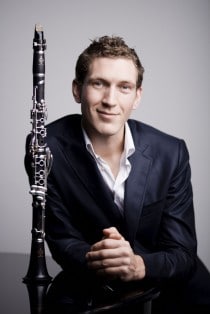Vorig jaar stond kunstenfestival Musica Sacra in het teken van ‘de weg’, geïnspireerd op de vele pelgrimsroutes die naar heilige oorden leiden. Dit jaar draait het in Maastricht om het ‘offer van liefde’. Op het eerste oog een anachronistisch thema, dat haaks lijkt te staan op de sentimenten in onze huidige maatschappij. De agressie tegen asielzoekers, het nietsontziende winstbejag van grote bedrijven en banken, maar ook onze eigen vaak egoïstische levensinstelling lijken weinig ruimte te bieden voor onbaatzuchtigheid.
Misschien is het thema juist daarom wel heel raak. Door ons vier dagen onder te dompelen in kunst die getuigt van mededogen en opofferingsgezindheid, komen we wellicht ook zelf tot bezinning. Uit het ruime aanbod koos ik vijf concerten die je niet wilt missen.
Terry Riley: Salome Dances for Peace

De Babylonische prinses Salome verleidt met een sensuele sluierdans haar oom en stiefvader Herodes. De geile oude bok heeft haar in ruil beloofd elke denkbare wens te vervullen en zij vraagt om het hoofd van Johannes de Doper. Uit wraak, want Johannes heeft haar avances bruut afgewezen. Zodra ze zijn bloedende kop krijgt aangeboden, drukt ze triomfantelijk een kus op zijn nog warme, maar levenloze lippen. Herodes heeft zo wel een erg gruwelijk ‘offer van liefde’ gebracht, op kosten van een ander bovendien. Richard Strauss maakte er een meeslepende opera over.
De Amerikaanse minimalist Terry Riley presenteert een heel andere visie in Salome Dances for Peace voor strijkkwartet. In plaats van een wraakzuchtige, necrofiele puber schotelt hij ons een moderne sjamaan voor, die haar verleidingskunsten inzet om wereldwijde vrede te bewerkstelligen. De vijfdelige cyclus paart een stuwende puls aan lyrische en verstilde passages, met echo’s van jazz, blues, Indiase Ragas en Aziatische muziek. Vorig jaar was Riley te gast bij het Minimal Music Festival in het Muziekgebouw aan ’t IJ in Amsterdam. Nu wordt gefluisterd dat hij voor de Nederlandse première van de integrale cyclus naar Maastricht zal komen.
Frank Martin: Le vin herbé
Richard Wagner maakte in zijn opera Tristan und Isolde de tragische liefde tussen de titelhelden onsterfelijk. De Ierse prinses Isolde wordt uitgehuwelijkt aan Koning Marc van Cornwall, wiens aangenomen zoon Tristan haar zal ophalen. Tijdens de overtocht drinken zij van een afrodisische kruidenwijn, die hen doet ontbranden in een fatale liefde. Uit trouw aan Marc besluiten zij hun liefde af te zweren, maar het bloed kruipt waar het niet gaan kan: als Tristan zwaargewond op sterven ligt, wil hij Isolde nog één keer zien. Zij bereikt hem echter te laat en sterft van liefdesverdriet.
De Zwitsers-Nederlandse componist Frank Martin componeerde aan het begin van de Tweede Wereldoorlog zijn op hetzelfde verhaal geïnspireerde Le vin herbé (de gekruide wijn). Dit ‘wereldlijk oratorium’ is met zijn kleine bezetting van twaalf stemmen, zeven strijkers en piano bewust anti-wagneriaans. De muziek van Wagner werd door de nazi’s immers zeer bewonderd. Tegenover de bombast van zijn Duitse voorganger plaatst Martin ingetogen, maar daarom niet minder aangrijpende muziek, die met zijn reciterende zangstijl een Franse sfeer ademt.
Laila en Madjnoen
Tijdens de opening van het afgelopen Festival Oude Muziek riep Jet Bussemaker de organisatie op meer in te zetten op een nieuw en diverser publiek. Musica Sacra bedient de minister op haar weken met het drieluik Laila en Madjnoen. Deze Arabische legende uit de elfde eeuw werd later onsterfelijk gemaakt door de Perzische dichter Nizami Ganjavi. Ook in dit gedicht speelt tragische liefde de hoofdrol: Kais en Laila worden hevig verliefd op elkaar, maar haar familie verzet zich en verbiedt hen elkaar nog ooit te treffen.
Laila wordt uitgehuwelijkt aan een andere man, maar Kais blijft, steeds wanhopiger, haar schoonheid bezingen. De mensen noemen hem ‘de waanzinnige, de madjnoen’. Uiteindelijk zwerft Kais doelloos door de woestijn, van zijn verstand beroofd en gehuld in lompen. Van heinde en verre komen mensen luisteren naar de verzen die hij blijft maken voor zijn onbereikbare geliefde. Laila sterft van verdriet; Madjnoen blaast bij haar graf zijn laatste adem uit. Hun verhaal wordt in drie verschillende versies uitgevoerd, door het Mehmet Polak Trio, het Abbas Bakhtiari Trio en de zanger Anass Habib.
Christoph Willibald Gluck: Alceste
Een wel heel bijzonder offer van liefde brengt Alceste in de gelijknamige opera van Gluck. Zij is bereid te sterven in plaats van haar dodelijk zieke echtgenoot, Koning Admetos. Zodra ze haar leven aan de goden heeft aangeboden, herstelt Admetos op miraculeuze wijze, tot grote vreugde van zijn volk. Een bode vertelt hem dat kennelijk iemand bereid was zijn leven voor hem te geven, waarop hij vermoedt hoe de vork in de steel zit.
Desgevraagd bekent Alceste haar voornemen, maar ondanks de smeekbeden van Admetos weigert ze ervan af te zien. Hierop besluit de koning haar te volgen in de dood. Getroffen door hun onvoorwaardelijke liefde, die tot over de grenzen van de onderwereld reikt, besluiten de goden beiden te laten leven. De opera wordt uitgevoerd door studenten en alumni van het Koninklijk Conservatorium in Den Haag en Ensemble Currende.

Lars Wouters van den Oudenweijer: Dialogue de l’ombre double
De Nederlandse klarinettist Lars Wouters van den Oudenweijer brengt een soloprogramma, vernoemd naar Dialogue de l'ombre double van de afgelopen januari overleden Pierre Boulez. Dit werk voor klarinet en elektronica is geïnspireerd op een scène uit het monumentale toneelstuk over liefdesverzaking Le soulier de satin van Paul Claudel. In Boulez’ iconische werk uit de twintigste eeuw voert de solist een dialoog met – door hemzelf gespeelde – muziek op band.
Al spelend loopt de uitvoerder van muziekstandaard naar muziekstandaard, terwijl de klank van de opgenomen fragmenten uit zes verschillende luidsprekers komt. De alle perken te buiten gaande, razendsnel tussen registers springende virtuoze loopjes lijken één grote jubel op het leven. Wouters van den Oudenweijer combineert dit met werken van Stockhausen, MacMillan en met een Parafrase van Alexander Goehr op Monteverdi’s Il combattimento di Tancredi e Clorinda. Hierin verslaat de kruisridder zijn Saraceense geliefde, die hij door haar harnas niet heeft herkend.
Ik hoop u bij een van deze concerten te treffen.
Meer informatie en de speellijst vindt u here.
